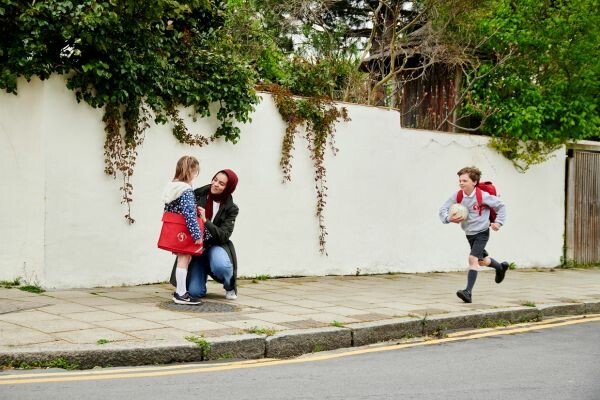Koru Kids spoke to parents who have been there, done that, and have lived to see bedtime restored to its rightful place. If you have advice to add, comment on our Bringing Up Great Kids Facebook group.

Understand what a big deal this is
Some children get angry, some sad, some clingy and some are very inquisitive, but they’re all expressing healthy responses to what is a major change in their small worlds. “They usually show their anxiety through emotions,” says Emma, an early years teacher in London. “Tears, being clingy towards parents, and asking parents if they’ll stay with them are usually common anxiety signs. It’s very normal for children to feel anxious about starting school, it’s a huge step for them both cognitively and emotionally,” she says. Try and put yourself into their (brand new) shoes.
Keep answering the questions
Children are full of questions about school, both before and after they start, and it’s important to answer them candidly. Helen, a mum of four, says it’s best to “answer the questions honestly. Sometimes they aren’t bothered about the answer, just that there is one.” Children often need reassurance about going to the loo or getting changed for PE, so make sure you have these covered. Stay upbeat in your chats about school; mum-of-three Kara says she and her son always “spoke very positively about school and all the changes that would happen and about how in the evenings and weekends we would have special time together.”
Be honest
Don’t tell your child you’ll be back soon when you’re leaving them all day. “It is very often parents that make anxiety worse by wanting to stay as long as they can,” says teacher Emma. “I usually encourage parents to spend a bit of time dropping off during the first couple of days—a look around the room, finding pegs, drawers etc, cuddles—and then out of the door. I always tell parents to tell their child they will be back at 3.30. A lot (of parents) will say ‘Mummy is going to get a coffee and is coming back.’ As a parent, it is very tempting to say that if the child is upset but essentially it will worsen the situation as their child will then be constantly asking where their parent is and become more and more upset, not wanting to ever come back the next day. I always use a visual timetable in my class with everything we are doing that day, and then use a little figure to go down the timetable, signalling how long we have until the end of the day.”
Snacks and routines FTW
If possible, keep to a familiar routine after school, especially around bedtime. On pick up, gauge whether they need to talk through their day or they’d rather have some time to digest everything. “I learned to not ask too many questions on pick up as she was so knackered and cranky. My job was to hand over the snacks and shut up until we got home,” says Ruth, a mum of two, about her eldest daughter’s early days. Children are often famished on pick up and will want snacks as soon as their bottom hits the car seat. Take snacks with you on the school run and have them ready to go.
Know their limits and adapt
While routine can be reassuring, after-school tiredness may demand some flexibility from you.“We let her talk and (there was) no pressure to do things when we got home. Some days she was so tired she just wanted to collapse in front of the TV and we let her have early nights until she got used to the routine,” says Anna, a mum of two, of her eldest daughter’s experience. Bringing bedtime forward to accommodate an exhausting day is, after all, better than having someone fall asleep in their spaghetti hoops.
Armed with honesty, patience, and a whole glove box full of your child’s favourite snacks, you should be on track to help them through this exciting and challenging time. Two or three weeks in and no doubt you’ll have a whole load of different concerns to contend with: lost socks, testy friendships and how on earth to fit that many birthday parties into 52 weeks of the year. Good luck.
The Bringing Up Great Kids email newsletter
A selection of the best articles we’ve read each month on child development & psychology, parentings tips, and how to bring up (great) kids.



